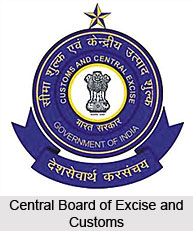 The Department of Revenue exercises control in respect of revenue matters relating to direct and indirect Union taxes, through two statutory Boards, namely, the Central Board of Direct Taxes (CBDT) and the Central Board of Excise and Customs (CBEC). The Department is also entrusted with administration and enforcement of controls and regulatory measures provided in the enactments concerning central sales tax, stamp duties, forfeiture of properties of smugglers and foreign exchange manipulators, and other fiscal statutes. Control over production and disposal of opium and its products is also vested with this Department.
The Department of Revenue exercises control in respect of revenue matters relating to direct and indirect Union taxes, through two statutory Boards, namely, the Central Board of Direct Taxes (CBDT) and the Central Board of Excise and Customs (CBEC). The Department is also entrusted with administration and enforcement of controls and regulatory measures provided in the enactments concerning central sales tax, stamp duties, forfeiture of properties of smugglers and foreign exchange manipulators, and other fiscal statutes. Control over production and disposal of opium and its products is also vested with this Department.
The Department of Revenue functions under the overall administrative direction and control of the Secretary (Revenue). Each Board, i.e., the CBDT and the CBEC, is headed by a Chairman who is also ex-officio Special Secretary to the Government of India. Matters relating to the levy and collection of all the Direct Taxes are looked after by CBDT, whereas those relating to levy and collection of customs and central excise duties and service tax fall within the purview of CBEC. The CBDT is headed by Chairman, Central Board of Direct Taxes. It has a sanctioned strength of six members. The CBEC is headed by Chairman, Central Board of Excise & Customs. It has a sanctioned strength of five Members. The two Boards were constituted under the Central Board of Revenue Act, 1963. The Headquarters administration is looked after by an Additional Secretary (Administration). He is also responsible for technical coordination between the two boards (CBDT and CBEC). The Central Economic Intelligence Bureau is headed by a Director-General and ex-officio Special Secretary.
The Headquarters of the Department of Revenue looks after matters relating to all administration work pertaining to the Department, all matters relating to economic intelligence, coordination between the two Boards, i.e., CBDT and CBEC, administration of the Indian Stamp Act, 1899 (to the extent falling within the jurisdiction of the Union ), the Central Sales Tax Act, 1956, the Narcotics Drugs and Psychotropic Substances (NDPS ) Act, 1985 and SAFEMA ( FOP ) Act, 1976, and matters relating to the following organizations/offices: Directorate of Enforcement, Central Bureau of Narcotics (CBN) and Opium Factories, Central Economic Intelligence Bureau (CEIB), Settlement Commission (Income Tax/Wealth Tax), Settlement Commission (Customs & Central Excise), Authority for Advance Rulings for Income-tax, Authority for Advance Rulings for Customs and Central Excise, Customs, Excise and Service Tax Appellate Tribunal (CESTAT) and Competent Authorities under SAFEM (FOP) Act.




















